Guardian of New Lives
Doctor a Pioneer in Diagnosis and Management of Fetal Heart Disease
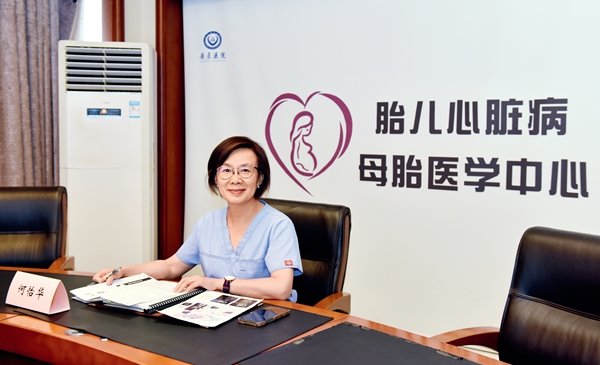
"Making an all-out effort to safeguard the health of every newborn" has long been the firm conviction of He Yihua, a professor with Beijing Anzhen Hospital, under Capital Medical University. She is a founder of China's first fetal heart disease and maternal-fetal medicine center. During the past 11 years, He and her team have dedicated themselves to researching fetal heart diseases, and especially to finding ways to prevent and control birth defects. They have also promoted the latest concepts and techniques in maternal-fetal medicine throughout China. In recognition of her tremendous contributions to the field of maternal-fetal medicine, He has received several awards and titles, including being named 2021 Capital Most Beautiful Woman Striver, and being awarded 2024 Capital Labor Medal.
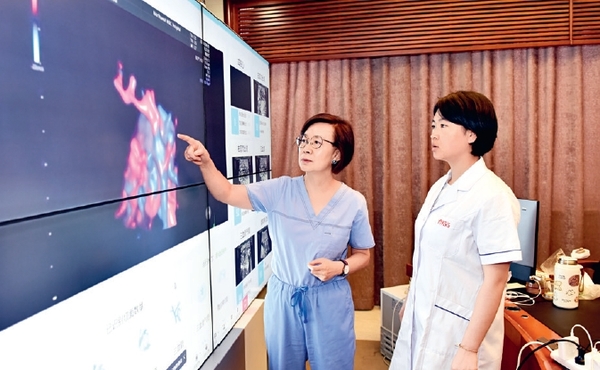
Helping Women Have Healthy Children
Congenital heart disease (CHD) accounts for more than 40 percent of all birth defects in China, and CHD is becoming a burden on affected families, society, and the country as a whole.
Su He (not her real name) believed she had no other option but to have an abortion, because there was something wrong with the heart of her fetus. That was until she met He Yihua. Su had visited many hospitals, and undergone numerous prenatal ultrasound examinations, all of which indicated the heart of her fetus was defective.
Despondent, Su decided to consult He, who conducted a thorough examination, including ultrasound, and, based on her extensive experience, He determined a problem with the placenta was affecting the heart of Su's fetus.
He told Su she could give birth to a healthy baby, but He stressed Su had to have regular checkups and monitoring by an obstetrician, to ensure the health of the fetus' heart and lungs. In the end, Su gave birth to a healthy baby.
Statistics indicate more than 100,000 women have consulted doctors, about fetal heart disease, at the maternal-fetal medicine center. The center has also helped women, across China, give birth to healthy babies through its remote medical-service system.
"Chinese now regard a fetus as a life, and each fetus with a heart defect is seen as a CHD patient. That is a symbol of a positive conceptual change brought by social development," says He. During fetal development, a problem might occur in any organ, or even in a blood vessel, she notes. Some fetal diseases may be fatal, but many diseases are curable, she adds.
It is crucial that pregnant women have ultrasound examinations, so their doctors can monitor the fetuses' hearts. Why? So they can detect as early as possible the development of any possible disease. Some fetuses diagnosed with complex CHD will have poor quality lives, even if they undergo surgeries after birth, He says. Early diagnoses, based on risk stratification, will help doctors and families decide if abortion is the best option, she adds.
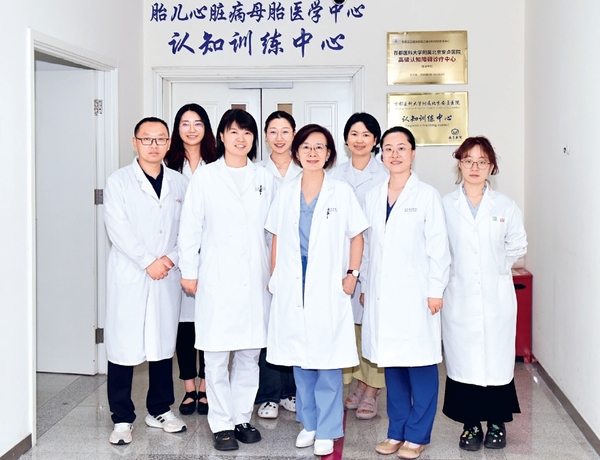
Professional Medical Platform
Prior to 2013, He had worked in the departments of cardiovascular medicine and cardiac ultrasound (for adults).
In 2013, He realized some pregnant women were deciding prematurely — after their fetuses were diagnosed with CHD — to have an abortion. Those women made their decisions without having received adequate information from their doctors about potential treatments for their fetuses. In some instances, the women didn't know their fetuses suffered from complex CHD until after giving birth. In those situations, the babies had missed the perfect time to receive medical treatment.
It most surely is a painful experience for parents to learn their baby has been born with incurable CHD. One of He's friends has endured that experience. Her friend's daughter was diagnosed with complex CHD, and the girl could not take part in most outdoor activities, as she was at risk of heart failure. The girl died at age 14.
He says she will never forget the sad expression in her friend's eyes when they talk about the girl. "If the girl had been diagnosed with CHD before she was born, and if she had received surgeries at an early stage, she might have lived longer," He says.
The girl's death was the impetus that caused He to focus her career on the diagnosis of CHD.
"Every day, we see living fetuses on the screens of ultrasound-imaging machines, and we see the worried looks of families … When we are asked whether an expectant mother can give birth to a baby with a heart problem, in a safe way, we want to provide comprehensive information … and we want to make professional treatment plans. To do so, it is far less enough to depend on one department's strength," says He.
To ensure the safe delivery of a fetus with a heart problem, a comprehensive knowledge system — which involves ultrasound imaging, treatment strategies (for the fetus and newborn), pregnancy management and the diagnosis of genetic diseases — is needed. With that in mind, He decided to establish a platform for the provision of all-round prenatal diagnosis and consultation, perinatal management and emergency treatment of newborns. The maternal-fetal medicine center was established in August 2013.
"We have tried our best to strengthen the connection between the prevention, diagnosis and treatment of CHD, and we have ensured doctors in the center are able to make diagnoses from a cross-department perspective," He says.
The center has a team of doctors, and a laboratory so they can conduct research. "Making diagnoses based on ultrasound examinations is like fighting a war. With unremitting 'fights,' and based on a network of extensive knowledge, we are capable of judging a fetus' condition, and even saving a life, within several minutes," says He.
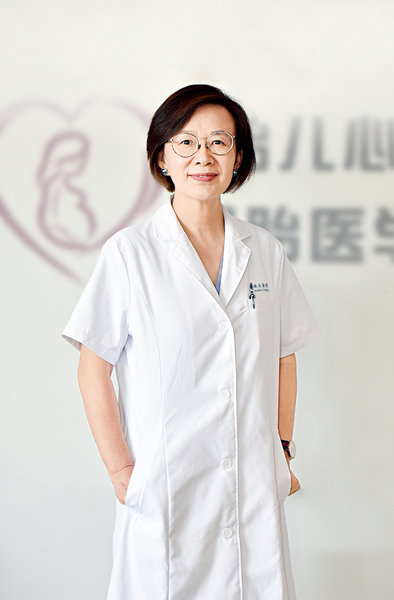
Remote Medical Platforms
During the past decade, He has given lectures across China on the importance of and concepts related to maternal-fetal medicine. Through the lectures, she has shared screening and diagnosis techniques with medical workers. She has also adopted artificial intelligence (AI) and remote-medical-service systems that connect the maternal-fetal medicine center with hospitals in far-off areas.
He's decision to use remote-medical systems dates back to 2012, when she participated in a medical-assistance tour in Diqing Tibetan Autonomous Prefecture, in Southwest China's Yunnan Province.
During the two-week tour, He discovered a remote-medical-consultation-service room in a small hospital — at the foot of Meili Snow Mountain, in Diqing. "Online medical services help patients in remote areas receive high-quality treatment over a long term," says He.
Using a remote-service system, He explained how the process of ultrasound checkups can be simultaneously transmitted, and how doctors in big cities can provide guidance to peers in remote areas, to ensure key information is obtained during the checkups.
In 2015, He's team built a remote-collaboration platform to provide maternal-fetal-medicine-consultation services to hospitals throughout China.
However, the work of just one team is insufficient to meet the country's huge demand for diagnoses and treatment of difficult diseases. "One needs many years of education to become a doctor. If we use AI technology to assist grassroots doctors and experts, the efficiency of medical services will largely improve," says He.
He's team developed an AI-supported medical-service platform that controls the quality of fetal echocardiography imaging. The platform also assists doctors in conducting prenatal screening and providing diagnoses.
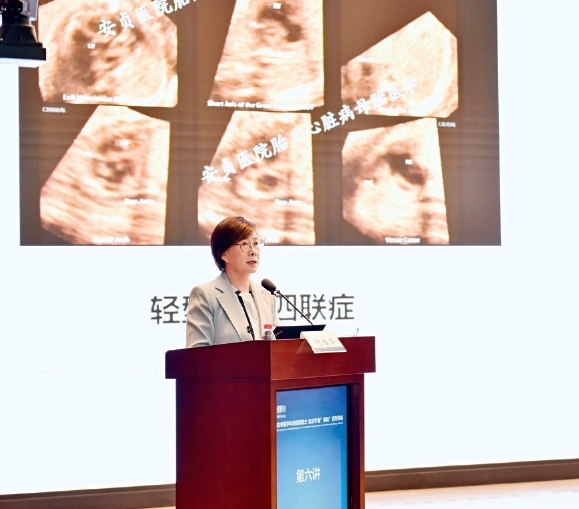
Progress
In an effort to prevent CHD, He's team has been conducting cross-disciplinary research into the genetic pathogenesis of the disease. The team established the world's largest CHD maternal-fetal-medicine database. Coincidentally, the team has paid close attention to families of pregnant women who are at high risk for CHD.
When a pregnant woman has an appointment at the center, the team collects all relevant information about all potential factors in the woman's life that can impact fetal development, including the woman's habits, disease history and her living environment.
"To prevent a pregnant woman, who has the gene of Marfan syndrome, from giving birth to a child with the rare disease, we make prenatal diagnoses of structural abnormalities, based on the genetic analysis of the high-risk population," says He.
Beijing Anzhen Hospital works with the team of Qiao Jie, an academician of the Chinese Academy of Engineering, in examining the high-risk genetic spectrum before pregnancy.
"The development of this discipline should be standardized, and the cultivation of professional teams nationwide should be the main task," He says. She and her team will always strive hard for progress in the discipline's development.
Photos by Zhang Jiamin
(Women of China English Monthly September 2024)
Editor: Wang Shasha
Please understand that womenofchina.cn,a non-profit, information-communication website, cannot reach every writer before using articles and images. For copyright issues, please contact us by emailing: website@womenofchina.cn. The articles published and opinions expressed on this website represent the opinions of writers and are not necessarily shared by womenofchina.cn.








.jpg)

 WeChat
WeChat Weibo
Weibo 京公网安备 11010102004314号
京公网安备 11010102004314号